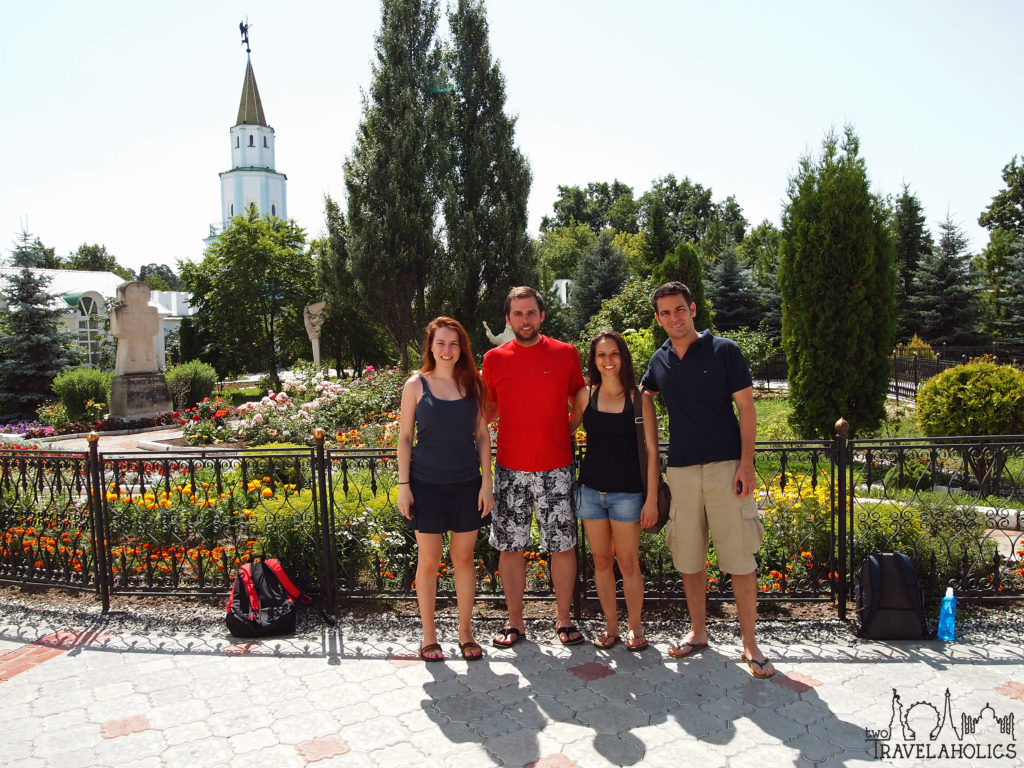When it comes to trusting strangers on the road, a lot of travelers err on the side of safety and avoid doing anything that might put their possessions or themselves at risk. Whether it’s news reports or firsthand experiences that has created a general sense of distrust, the result is the same, which is the feeling that trusting a complete stranger just seems foolish. Even though we were wary at first, Tara and I stayed with numerous strangers during our travels abroad.
These strangers would offer up their home to us, usually a bed, sometimes an entire room, but always a comfortable and safe place to sleep for the night. During the day, sometimes our hosts would give us guided tours of the city they lived in, and other times we would be given lists of sights to see and new things to try out. Our bags (which held all our earthly possessions) would remain in their homes, a deep implicit trust that they would remain undisturbed during our absence. Somehow the drumbeat of rape or murder sounding off from our parents and society disappeared from our consciousness.
However, getting to that level of comfort with the Couchsurfing community did not happen overnight. In fact, it took a couple times surfing for us to realize there was no catch. The kindness of these strangers was based in altruism. Tara and I were initially leery, raised to believe that if someone was being nice to you, they had an ulterior motive. These external pressures and attitudes pervaded our thoughts, making us fearful, but as we traveled, our fears were slowly stripped away. But in order to understand our journey to embracing and loving the Couchsurfing community, you have to start from the beginning of our exploration of the site.
Leaving our misconceptions at home
A year before we left on our around–the-world trip, we began researching alternative booking sites for accommodations, like AirBnB and Couchsurfing. Both sites have the same general concept (though one costs money to utilize while the other does not): rooms, apartments, and houses are offered to strangers seeking a place to stay. Both sites have numerous structural similarities, too: you join by creating a profile and you can either host travelers in your home or search for people willing to host you. Your profile can be strengthen by linking it to your Facebook account to show that you are indeed a real person, and by adding your credit card or mailing address to the backend, the site verifies that your information is legitimate. The more involved you are in each community, the more feedback you receive (your interactions result in “reviews,” which are posted to your account). If you use either site on a regular basis, it is easy to amass friends, references and reviews, which helps show other community members that you are trustworthy. On the flip side, those who are disrespectful quickly get flagged and feedback is left on their profile as a warning to others to avoid them.
After signing up for both sites, the only difference we could find was that AirBnB hosts charge for accommodations, whereas Couchsurfing hosts do not. This raised the question, why pay for something you could get for free? In a way, this viewpoint showed our naivety to the Couchsurfing community. From the outside looking in, the Couchsurfing community appears to be a bunch of hippies giving away a resource they could be charging for.
Since one of our motivating factors for joining Couchsurfing was rooted in saving money, and the first country we were set to visit (Iceland) was guaranteed to be one of the most expensive countries we’d visit, it is easy to see why we eagerly embraced the site’s concept. After all, this was a very real opportunity to save hundreds if not thousands of dollars over the course of our 14-month trip. Tara and I giddily thought we could surf around the globe. But as is life, expectations and reality rarely align.
You’re doing it all wrong
A quick search of the Couchsurfing community’s database shows how involved some members are when it comes to creating their virtual representation. Some may only type a few words describing themselves, have one picture (sometimes of a random image and not even themselves), while others will be incredibly detailed and comprehensive with loads of pictures and information about the foods they love and adventures they want to experience. Since everyone starts with a blank slate, why did some members feel the need to share so much? After all, strangers are strangers regardless of their mutual love of the TV show “Arrested Development.” Yet, some profiles were filled with intimate, personal details. Sharing the minutiae and the mundane actually seemed to matter, as we noticed a direct correlation between those who spent more time on their profiles and the number of references and friends they had.
Armed with this knowledge, we went about beefing up our profile (Tara and I created a joint account). In it, we listed our favorite movies, music and cuisine. We uploaded pictures and listed the countries we have visited. Cobbling bits of our Facebook profiles and other tidbits, I soon felt comfortable that it was a healthy representation of both of us. (At this point in our pre-trip planning, Tara and I had assumed certain responsibilities, and in the case of Couchsurfing, I took it on as my own.) Since Iceland and Russia were two of our first destinations during the trip, I began searching for hosts in those locations. Couchsurfing allows its members to search for hosts in particular cities by using date ranges, number of surfers and you can even filter the type of host you are hoping to stay with (these filters include age, gender, whether you’re looking for a bed or just someone to meet up with, etc.).
When it comes to searching, the process is fairly easy: Punch in a city and fill out any filters, and you are presented with all the members of Couchsurfing affiliated with that city. Results are then populated according to whether they are available (either to host or meet up) or unavailable. As I mentioned, you can filter these results, but in the case of Iceland, filters were not necessary, as most towns (having such small populations) either did not have hosts or only had one. The scarcity of hosts meant that I sent requests to nearly everyone. The enormous distance gaps between hosts (they were mainly concentrated in the capital, Reykjavík) all but guaranteed that even if we were hosted a few times throughout our two-week drive around the island, there would still be certain cities where we’d have to find alternate accommodations. Suddenly, the hope of Couchsurfing – and therefore not paying for lodging – every night of our trip began to evaporate.
And since I was still looking at Couchsurfing as a cost-saving measure, my requests subtly reflected this. Requests were sent more out of geographical motivation than anything else. I was still very much hedging on the side of quantity versus quality. Worse, in the first couple months of sending requests, I had a false impression that every host would agree to let us surf with them. Without having formally hosted anyone previously, my viewpoint was selfish and simply misinformed. The heart of the Couchsurfing community is built on humanity and desire to help others. Even so, most members joined not to act as bed-and-breakfast owners, but as a way to interact with strangers and pay forward (or pay back) kindness they have experienced. The key point is that there is no obligation for any host to accept a request. Common reasons a host might reject a request include already hosting someone else, the host will be traveling, they might be burnt out of hosting (maybe they hosted back-to-back surfers and just want to take a break), your request might be too far in advance (most hosts are also travelers and might not know their plans two months in advance), they think the request is too generic and not personal enough, or perhaps they are just not comfortable with the surfer (the result of a having a neutral or bad reference, their gender, or a multitude of other reasons).

Our CS hosts let us use their grocery store loyalty card one night, which allowed us to get “behind the scenes” at the Chingay Chinese New Year Parade in Singapore.
It also helps to think of a request as more akin to a job application. The more effort you put into it, the higher the acceptance rate. Anonymous, blanket requests are easy to spot. Even though my first round of requests were the equivalent of hostel reservations, some hosts accepted. Those who did decline often offered recommendations for other places to stay, attractions to see or other insights into the area they lived. The messages were always polite and usually filled with helpful tips that we used while passing through. Reading these responses encouraged me to write more personalized requests later.
Gifts not required
Much as our requests’ content improved over time, so too, did our understanding of surfer etiquette. As Americans, Tara and I were cultured to believe that if a friend or family member hosts you, it is nice to give a thank-you gift. However, we were confused as to how this applied to Couchsurfing. Should we show up with a gift in hand – a thank-you present for hosting us? Everything we read made it seem unnecessary, yet we could not shake the desire to show up with a little something for our host. Before we left the U.S., we saw some chocolates that came in a passport box at the airport’s duty free shop and grabbed a few for our future hosts. We would wait until we were about to depart from their home, as we gave our thanks and goodbyes, to give them the chocolates. While gracious, we could tell the hosts felt the gesture was gratuitous.
We hated the slight awkwardness that came from the introduction of a bona fide gift. Many members of the community prefer to avoid monetary issues by addressing them on their profile using disclaimers such as: “Unless otherwise agreed, if we go out for meals or other activities, each person should expect to pay his/her own bill.” Yet, it was hard not to want to show our appreciation to our hosts. Although there is no official rulebook to surfing, we found that cooking and sharing a meal became our go-to way of thanking our host, and it also allowed us to spend quality time together and sometimes teach each other about cuisines.
Finding your comfort zone
Within the first month of our trip, Tara and I couchsurfed with three different hosts. The learning curve for Couchsurfing is sharp. You go from shaking hands with a stranger on the street to walking into their home. Sometimes these first meetings occur late at night, right after arriving in a new city via plane, train or bus. Other times it’s in the middle of the day after you wait for your host to arrive home from work. There is no formal schedule for how your stay will play out either. If it is late, you might go straight to bed, or other times you might talk the night away with your host. Some hosts work during your stay and will not be able to show you around, while others will go out of their way to be your own personal tour guide. The lack of structure and not knowing what to expect can make for a stressful first few experiences.
Reflecting on our early Couchsurfing experiences, it is easy to pick up on the discomfort we felt. Embracing the idea of a free place to stay was easy, but the reality of showing up in a foreign city and sleeping in a stranger’s bed was a little more difficult to wrap our head around. Our hosts were incredibly sweet, but the truth is that it was initially a little harrowing. Letting our guard down meant pushing away the fear and distrust of strangers that we were bred to believe.
Beyond trust and fear, another feeling that comes to mind when we first started surfing was guilt. Much like we felt the need to bring a gift, we felt uncertain of the amount of interaction we were “supposed to have” with our host. If we were not showing up with a thank-you gift, should our payment be in conversation? As stupid as it sounds, we almost had to rethink simple social cues. Some hosts would chat all the time, others were laid back and let us do as we pleased, some would go out exploring the city with us, and others would see us only in the mornings and evenings,. No matter which path they chose, most hosts we stayed with were long-time Couchsurfing members who knew the magic balance between nurturing a budding friendship and avoiding stifling it.
On an interesting note, we found that the dynamic between our interactions with our AirBnB and Couchsurfing hosts were wildly different, perhaps propelled by the differing attitudes of both communities. AirBnB hosts were all business. Our few times utilizing the site seemed no different than if we had chosen to stay in a hostel. This not only directly affected the conversations, or lack thereof, but the desire to keep in touch after staying with someone. Couchsurfing rewards its surfers and hosts with generally awesome cultural and personal interactions. Community members join for the experience, not as a means of saving money, whereas AirBnB hosts see a void and opportunity to make money from unutilized space – they are not being paid for conversation and generally do not make it. This translates to an independent stay, but no real need or desire to keep in touch afterward.
While Tara and I may have felt some uneasiness at first, it was the openness of our hosts that brought us around and made us feel more comfortable overall. Most of our hosts were veteran members; they had hosted or surfed numerous times and had quite a few references. Making us feel welcome was second nature to them. Whether it was cooking dinner, introducing us to their friends, or just giving us a list of sights to see on our own, they had a pulse on how to make our experience memorable.
As we surfed more, that initial discomfort completely disappeared. Within an hour of meeting our hosts, we often felt like long-lost friends, meeting again, only for the first time. There would be times when our politics or opinions did not align with our hosts, but never to the detriment of the overall experience. If anything, the Couchsurfers we met were always curious and always adventurous. When our ideas differed from their own, it did not lead to forced conversations rooted in conversion; rather, these conversations felt like an open exchange designed to explain your beliefs. Whether liberal or conservative – how did you come to form that opinion? Even when it came to religion, a taboo subject among most strangers or even friends, we found our hosts to be the perfect people to ask questions to. It is a cultural exchange without barriers.
By the end of our around-the-world trip, we had surfed with 12 hosts. Looking back, it is interesting to see the process in which our view of Couchsurfing has evolved. What was once a means of saving a couple dollars is now an invaluable opportunity to meet awesome people and to experience other cultures. Our hosts explored caves with us, introduced us to the best local food, taught us how to cook with fish sauce, and watched the sun set – and rise – with us. They offered their homes, sometimes giving us their house keys. They gave us their trust, their time, and their friendship. But most importantly, Couchsurfing taught us how to look outside of our circle of friends and family to find goodness in strangers. After all, strangers are just friends you haven’t met yet.















Such a well written post! I’m so glad to see how your opinion of Couchsurfing has changed with time and experience. We have used and still use CS whilst travelling and we really think it’s an incredible way to get involved with locals and if we are lucky to meet friends for life. If done with the right spirit and mutual respect, couchsurfing can be amazing and so far has gifted us with some of the most memorable travel stories.
Thanks Franca! It really is a loving community that might take a little bit of courage to get into, but once you’re in, it’s wonderful. 🙂